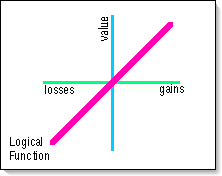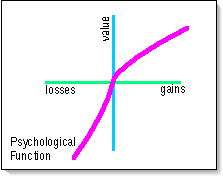
Framing II
Framing III
Framing IV
Framing V
Framing VI
Framing VII
Framing VIII
Risky Behavior and Negative Framing:
The Roots of Modern Framing Research
Risky Behavior and Negative Framing:
The Roots of Modern Framing Research
 Kahneman & Tversky (1979)
were interested in understanding the conditions under which people
made conservative or risky judgments. They observed evidence
supporting what they called "prospect theory:" that
the prospect of a loss has a greater impact on decision making
than does the prospect of an equivalent gain. Considerable evidence
has amassed supporting the statement that humans do not consider
gains and losses logically. A decision maker will select the
option with the highest subjective utility, whether or
not that provides the highest objective gain (Kahneman &
Tversky, 1982).
Kahneman & Tversky (1979)
were interested in understanding the conditions under which people
made conservative or risky judgments. They observed evidence
supporting what they called "prospect theory:" that
the prospect of a loss has a greater impact on decision making
than does the prospect of an equivalent gain. Considerable evidence
has amassed supporting the statement that humans do not consider
gains and losses logically. A decision maker will select the
option with the highest subjective utility, whether or
not that provides the highest objective gain (Kahneman &
Tversky, 1982).
If actual gains and losses matched their psychological incarnations
exactly, you'd find that people who found a $100 bill would be
ten times as happy as those who found a $10 bill, and 100x as
happy as the person who found a $1 bill. The inverse should also
be true for losing money. If you were to plot a logical relationship
on a vertical axis of value (happiness at the top of the blue
line, unhappiness at the bottom) and a horizontal axis of valence
(gains on the right side of the green line, losses on the left),
it would look like this:

Logically, each increment in good fortune should represent
an equal increment of value (happiness). But the relationship
isn't this simple or logical. Finding a single dollar makes a
person disproportionately happy. Each additional dollar found
makes him happier, but not in a linear fashion. That first dollar
gives "the most bang for a buck" as far as pleasure
is concerned. Each additional dollar found, won, or earned gives
somewhat less pleasure than the previous one. Now let's look
at the losing end of the line. The loss of a dollar will make
the purple line dip faster than it rose when it was in gain territory.
The pleasure of winning money is less intense than the pain of
losing the same sum! Kahneman & Tversky (1982) plotted the
psychological relationship that exists between value, gains and
losses. I've copied it from their article and reproduced it below:

In the upper right "gain" quadrant, notice that "value" rises rather quickly in the lower value ranges and then levels off at higher ranges. This indicates that small fortunes are very efficient in making one happy. In the lower, or "loss" quadrant, notice that the line dips sharply below where the logical 45° line should be, and stays there. This demonstrates that losses are felt more keenly than is logical. Felt losses remain below the logical line throughout the range depicted, indicating that losing continues to hurt worse than "it actually is." Notice also that the loss line dips more sharply than the gain line ever rises. Again, we humans hate to lose. We'd rather not win, than lose!
Prospect theory, and its function above, give us an invaluable insight into human nature. We know that a human's first priority is not to lose--gains are secondary to the "no loss" rule. Thus, framing a decision in terms of possible loss should motivate a person more than framing the same decision in terms of possible gain. And, given various obligatory caveats and constraints which we explore later, subsequent research largely supports the contention that humans are acutely loss-averse and thus extraordinarily sensitive to loss frames. Continue . . .
www.workingpsychology.com
All rights reserved.
